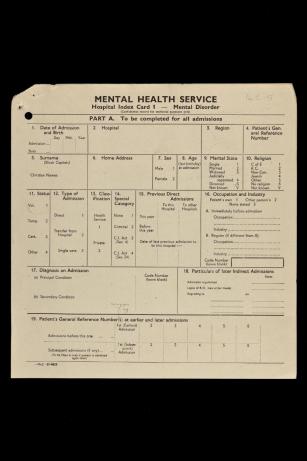Jun 2, 2022
Crazy Standards: The WHO and the Rise of Descriptive Psychiatry
- 15:00 to 16:30
- Seminar
- Max Planck Research Group (Biomedical Sciences)
- David Robertson (University of Princeton)

Hospital Index Card 1 – Mental Disorder, (5) Hospital Index Cards: Their Evolution from 30 Dec 1947 to 3 Dec 1948. Carlos Paton Blacker Collection. Wellcome Collection, London, p.86. https://wellcomecollection.org/works/pbrqrh4y.
Historians of psychiatry have often argued that the publication of DSM-III in 1980 was a revolutionary moment in the history of the discipline. By creating discrete mental disorder categories akin to the disease entities of other branches of medicine, DSM-III is presented as a historical rupture from psychoanalytic to descriptive understandings of mental illness. In this presentation I focus on an aspect of this history which has received considerably less attention, but which challenges this American-centered narrative. I argue that the resurgence of interest in a descriptive approach to the investigation of mental disorders began earlier than the established timeline suggests and that its origins were international. In the late 1950s, the WHO began creating universal standards for the epidemiological investigation of mental disorders. This reflected growing concerns over the reliability of mental hospital data, particularly for making comparisons between countries. Psychiatrists and statisticians inside the WHO attempted to resolve the reliability problem by developing a descriptive approach to the classification and diagnosis of mental disorders. This work was closely tied to revisions to the organization’s own classification, the ICD, and to groundbreaking epidemiological inquiries such as the International Pilot Study of Schizophrenia (1968). Preceding and, in fact, informing the revisions in DSM-III, these events form a crucial historical backdrop to the growing international dominance of descriptive psychiatry in the latter twentieth century.
Biography
- Lara Keuck
- Steeves Demazeux
Contact and Registration
The seminar series is open to all. To receive the zoom link, please email Birgitta von Mallinckrodt (OFFICEKEUCK@MPIWG-BERLIN.MPG.DE).
About This Series
This research seminar is hosted by the Bordeaux-Berlin WORKING GROUP ON TRANSLATING VALIDITY IN PSYCHIATRIC RESEARCH and brings together historians, philosophers, psychiatrists and biomedical researchers.
